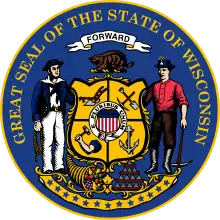Portage County, Wisconsin
Portage County is a county in the U.S. state of Wisconsin. As of the 2010 census, the population was 70,019.[1] Its county seat is Stevens Point.[2]
Portage County | |
|---|---|
 Portage County Courthouse in Stevens Point | |
 Flag | |
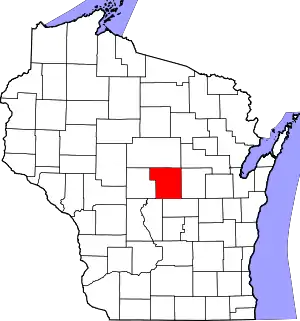 Location within the U.S. state of Wisconsin | |
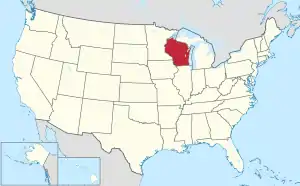 Wisconsin's location within the U.S. | |
| Coordinates: 44°29′N 89°30′W | |
| Country | |
| State | |
| Founded | 1844 |
| Named for | the portage between the Fox and Wisconsin Rivers |
| Seat | Stevens Point |
| Largest city | Stevens Point |
| Area | |
| • Total | 823 sq mi (2,130 km2) |
| • Land | 801 sq mi (2,070 km2) |
| • Water | 22 sq mi (60 km2) 2.7%% |
| Population (2010) | |
| • Total | 70,019 |
| • Estimate (2019) | 70,772 |
| • Density | 85/sq mi (33/km2) |
| Time zone | UTC−6 (Central) |
| • Summer (DST) | UTC−5 (CDT) |
| Congressional district | 3rd |
| Website | www |
Portage County comprises the Stevens Point, WI Micropolitan Statistical Area and is included in the Wausau-Stevens Point-Wisconsin Rapids, WI Combined Statistical Area.
History
Portage County was created from the Wisconsin Territory in 1836 and organized in 1844.[3] Like the city of Portage, Portage County is named for the portage between the Fox and Wisconsin rivers; Portage County originally included the portage and Portage but boundary changes detached the county from its namesake.[4]
Geography
According to the U.S. Census Bureau, the county has a total area of 823 square miles (2,130 km2), of which 801 square miles (2,070 km2) is land and 22 square miles (57 km2) (2.7%) is water.[5]
Major highways
|
|
Airport
Adjacent counties
- Marathon County - north
- Shawano County - northeast
- Waupaca County - east
- Waushara County - southeast
- Adams County - southwest
- Wood County - west
Wildlife refuges
- Buena Vista Marsh
- Dewey Marsh
- Mead Wildlife Area
- Paul J. Olson Wildlife Area
Demographics
| Historical population | |||
|---|---|---|---|
| Census | Pop. | %± | |
| 1840 | 1,623 | — | |
| 1850 | 1,250 | −23.0% | |
| 1860 | 7,507 | 500.6% | |
| 1870 | 10,634 | 41.7% | |
| 1880 | 17,731 | 66.7% | |
| 1890 | 24,798 | 39.9% | |
| 1900 | 29,483 | 18.9% | |
| 1910 | 30,945 | 5.0% | |
| 1920 | 33,649 | 8.7% | |
| 1930 | 33,827 | 0.5% | |
| 1940 | 35,800 | 5.8% | |
| 1950 | 34,858 | −2.6% | |
| 1960 | 36,964 | 6.0% | |
| 1970 | 47,541 | 28.6% | |
| 1980 | 57,420 | 20.8% | |
| 1990 | 61,405 | 6.9% | |
| 2000 | 67,182 | 9.4% | |
| 2010 | 70,019 | 4.2% | |
| 2019 (est.) | 70,772 | [6] | 1.1% |
| U.S. Decennial Census[7] 1790–1960[8] 1900–1990[9] 1990–2000[10] 2010–2019[1] | |||

As of the census[11] of 2000, there were 67,182 people, 25,040 households, and 16,501 families residing in the county. The population density was 83 people per square mile (32/km2). There were 26,589 housing units at an average density of 33 per square mile (13/km2). The racial makeup of the county was 95.73% White, 0.32% Black or African American, 0.36% Native American, 2.25% Asian, 0.04% Pacific Islander, 0.43% from other races, and 0.86% from two or more races. 1.44% of the population were Hispanic or Latino of any race. 32.8% were of Polish, 31.6% German, 5.4% Norwegian and 5.0% Irish ancestry. 93.9% spoke English, 1.7% Spanish, 1.6% Polish and 1.3% Hmong as their first language.
There were 25,040 households, out of which 32.10% had children under the age of 18 living with them, 55.10% were married couples living together, 7.30% had a female householder with no husband present, and 34.10% were non-families. 24.50% of all households were made up of individuals, and 8.80% had someone living alone who was 65 years of age or older. The average household size was 2.54 and the average family size was 3.07.
In the county, the population was spread out, with 24.10% under the age of 18, 16.20% from 18 to 24, 27.70% from 25 to 44, 21.10% from 45 to 64, and 10.90% who were 65 years of age or older. The median age was 33 years. For every 100 females there were 99.40 males. For every 100 females age 18 and over, there were 96.80 males.
In 2017, there were 674 births, giving a general fertility rate of 46.4 births per 1000 women aged 15–44, the third lowest rate out of all 72 Wisconsin counties.[12]
Communities
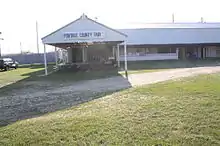
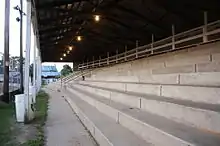

City
- Stevens Point (county seat)
Villages
Towns
Unincorporated communities
Ghost town/neighborhood
Politics
| Year | Republican | Democratic | Third parties |
|---|---|---|---|
| 2020 | 47.5% 19,299 | 50.3% 20,428 | 2.2% 876 |
| 2016 | 44.8% 17,305 | 48.0% 18,529 | 7.1% 2,755 |
| 2012 | 42.2% 16,615 | 56.1% 22,075 | 1.6% 647 |
| 2008 | 35.0% 13,810 | 63.0% 24,817 | 2.0% 795 |
| 2004 | 42.5% 16,546 | 56.1% 21,861 | 1.4% 554 |
| 2000 | 39.1% 13,214 | 53.2% 17,942 | 7.7% 2,604 |
| 1996 | 32.2% 9,631 | 53.1% 15,901 | 14.7% 4,396 |
| 1992 | 32.4% 10,914 | 46.1% 15,553 | 21.5% 7,249 |
| 1988 | 42.3% 12,057 | 57.2% 16,317 | 0.6% 161 |
| 1984 | 48.3% 13,605 | 51.1% 14,399 | 0.6% 175 |
| 1980 | 34.1% 10,465 | 53.6% 16,443 | 12.4% 3,794 |
| 1976 | 36.3% 9,520 | 60.7% 15,912 | 3.1% 805 |
| 1972 | 40.0% 9,346 | 58.1% 13,564 | 1.9% 431 |
| 1968 | 36.1% 6,180 | 58.5% 10,014 | 5.4% 927 |
| 1964 | 27.8% 4,579 | 72.1% 11,887 | 0.2% 32 |
| 1960 | 37.9% 6,436 | 62.0% 10,516 | 0.1% 20 |
| 1956 | 54.1% 8,320 | 45.6% 7,010 | 0.4% 56 |
| 1952 | 52.8% 8,499 | 46.9% 7,537 | 0.3% 51 |
| 1948 | 39.3% 5,424 | 59.1% 8,154 | 1.5% 213 |
| 1944 | 38.3% 5,405 | 61.4% 8,678 | 0.3% 42 |
| 1940 | 35.6% 5,670 | 63.8% 10,148 | 0.6% 94 |
| 1936 | 26.7% 3,969 | 71.3% 10,576 | 2.0% 299 |
| 1932 | 26.8% 3,434 | 71.7% 9,195 | 1.5% 191 |
| 1928 | 43.0% 5,161 | 56.4% 6,764 | 0.6% 70 |
| 1924 | 27.8% 2,854 | 19.6% 2,010 | 52.7% 5,416 |
| 1920 | 65.4% 5,527 | 31.4% 2,656 | 3.2% 269 |
| 1916 | 44.5% 2,520 | 53.0% 3,000 | 2.5% 140 |
| 1912 | 36.4% 1,932 | 43.3% 2,301 | 20.3% 1,079 |
| 1908 | 56.4% 3,269 | 40.8% 2,362 | 2.8% 163 |
| 1904 | 61.1% 3,633 | 36.5% 2,168 | 2.5% 146 |
| 1900 | 54.6% 3,285 | 43.8% 2,633 | 1.6% 98 |
| 1896 | 53.8% 3,537 | 44.0% 2,890 | 2.2% 146 |
| 1892 | 44.8% 2,291 | 50.2% 2,570 | 5.0% 258 |
References
- "State & County QuickFacts". United States Census Bureau. Archived from the original on February 28, 2016. Retrieved January 23, 2014.
- "Find a County". National Association of Counties. Retrieved June 7, 2011.
- "Wisconsin: Individual County Chronologies". Wisconsin Atlas of Historical County Boundaries. The Newberry Library. 2007. Retrieved August 15, 2015.
- "Wisconsin: Individual County Chronologies". The Newberry Library. Retrieved April 19, 2013.
- "2010 Census Gazetteer Files". United States Census Bureau. August 22, 2012. Retrieved August 8, 2015.
- "Population and Housing Unit Estimates". Retrieved March 26, 2020.
- "U.S. Decennial Census". United States Census Bureau. Retrieved August 8, 2015.
- "Historical Census Browser". University of Virginia Library. Retrieved August 8, 2015.
- Forstall, Richard L., ed. (March 27, 1995). "Population of Counties by Decennial Census: 1900 to 1990". United States Census Bureau. Retrieved August 8, 2015.
- "Census 2000 PHC-T-4. Ranking Tables for Counties: 1990 and 2000" (PDF). United States Census Bureau. April 2, 2001. Retrieved August 8, 2015.
- "U.S. Census website". United States Census Bureau. Retrieved May 14, 2011.
- "Annual Wisconsin Birth and Infant Mortality Report, 2017 P-01161-19 (June 2019): Detailed Tables". Archived from the original on 2019-06-19. Retrieved 2019-06-19.
- Leip, David. "Dave Leip's Atlas of U.S. Presidential Elections". uselectionatlas.org. Retrieved November 9, 2020.
Further reading
- Commemorative Biographical Record of the Upper Wisconsin Counties of Waupaca, Portage, Wood, Marathon, Lincoln, Oneida, Vilas, Langlade and Shawano. Chicago: J. H. Beers, 1895.
- Rosholt, Malcolm. Our County, Our Story: Portage County, Wisconsin. Stevens Point: Portage County Board of Supervisors, 1959.
- A Standard History of Portage County, Wisconsin. Chicago: Lewis Publishing Company, 1919.
External links
| Wikimedia Commons has media related to Portage County, Wisconsin. |
- Portage County government website
- Portage County map from the Wisconsin Department of Transportation
- Portage County Business Council, Inc.
- Portage County Historical Society
